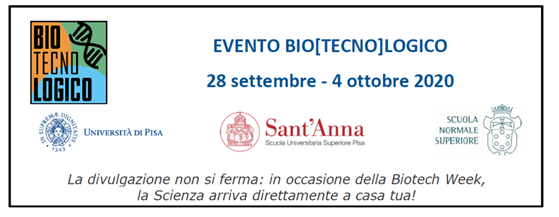Biotech Event: Roundtable discussion on Coronavirus and genetic engineering of food. Lessons learned and future challenges

Wednesday, September 30, 2020 (time: 5.30 – 8.00 pm)
Opening remarks: Rectors or Delegates
“We can summarize our lessons learned and new words: coronavirus, epidemic curve, serological tests… We have increased our understanding about the coronavirus global pandemic but little knowledge is available so far on the Sars-Cov-2. One of the problems that have been faced was the rapid spread of fake news. We are advised to use personal protective equipment but how can we protect ourselves from disinformation? We need to develop a vaccine against fake news and new forms of science communication to the public. Bringing together groups of participants and three experts, we will investigate the current understanding of SARS‑CoV‑2, the development of potential vaccines, and what measures aim at reducing the rate of infection transmission.”
Join us to discover the Bio[TECHNO]logy event
Monday 28 September 2020, 5.00 pm, Cinema Arsenale (Pisa)
The Bio[TECHNO]logy event opens with the documentary film "Food Evolution" (2016) by Scott Hamilton Kennedy audio described by Neil deGrasse Tyson (Italian subtitles). The film explores modern biotechnology, GMOs and agricultural-food industry. It is a good opportunity to discuss the environmental impact of GM crops, biodiversity conservation and future challenges of agribusiness.
Free tickets, 80 seats.
Speakers: Andrea Grignolio (University San Raffaele, Milan), Rino Rappuoli (GSK Vaccines, Siena), Marzio Sisti (Patto Trasversale per la Scienza - Piacenza).
Register (click) here for the webinar!
Roundtable discussion on the genetic engineering of food: failure, success and global challenges
Thursday, October 1st, 2020 (time: 6.00 – 8.00 pm)
“If ‘man is what he eats’, as stated by German philosopher Ludwig Feuerbach, we all should be bio-scientists because the food we eat is bio-engineered by humans. Humans have grown and harvested plants, fruit and vegetables over thousands of years. Beyond traditional breeding and selection, genetic engineering and biotechnology improved specific traits into plants and organisms. The application of biotechnology to agriculture produced increased yields, plant disease resistance, and enhanced product quality. Engineered crops targeted specific enhanced genotypes through the sequencing of crop genomes and DNA sequences that will create a sustainable gene inventory is regarded as vital to the agricultural sector and the growing world population in the next millennium. What methods of crop improvement have proven to be the most significant innovation?
What are the risks associated with the release of genetically modified plants into the farming system? What are the challenges of feeding the global population? Why agri-food biotechnology remains controversial among the consumers despite scientific consensus? This digital roundtable with leading experts will offer discussions about the lessons learned”.
Speakers: Luigi Cattivelli (CREA, Fiorenzuola d’Arda), Pierdomenico Perata (Scuola Superiore Sant'Anna, Pisa), Deborah Piovan (Cibo per la Mente, Padova).
Register (or click) here for the webinar!
For additional information, please contact:
evento.biotecnologico@gmail.com – Telephone +39 050 883271 (Servizio Orientamento)
Instagram: https://www.instagram.com/progetto.biotecnologico/?hl=it
Facebook: https://www.facebook.com/progetto.biotecnologico
Students from the University of Pisa, Sant’Anna School, and the Scuola Normale Superiore, have launched the Pisa Biotech Week event (the European Biotech Week 2020 takes place from 28 September to 4 October) to discuss genomics, research progress, vaccines and the role of communication with citizens during emergencies as well as the community responses in taking lessons learned from the Covid-19 experience.
